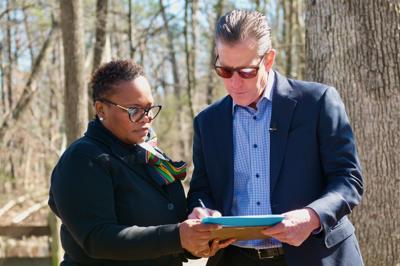
Nearly a year after JK Land Holdings President and CEO Chuck Kuhn announced his intention to donate 10 acres to the Loudoun Freedom Center, a decision by the State Corporation Commission approving an alternate power line route through the property will move the donation forward.
JK Land Holdings bought the 108-acre parcel adjacent to the African American Burial Ground For The Enslaved At Belmont over a year ago. The property, which is planned for two data centers, lies directly in the path of Dominion Energy’s future Aspen to Golden transmission lines.
Kuhn said he would donate 10 acres to the Freedom Center, which owns the cemetery, if Dominion would collaborate in an effort to move the transmission line 70 feet from where it was originally planned – moving it closer to the burial ground – and away from the planned data centers.
Moving the line to allow for the data centers to be built would make the donation economically possible, Kuhn said. Each acre of property is worth approximately $2 million, making the value of the 10-acre donation $20 million.
Dominion representatives have been working with both JK Land Holdings and the Freedom Center for over a year and half to determine the route for the transmission lines. Their application for the lines was approved by the SCC last week and included approval of a variation that would allow microsite adjustments on the JK Land Holdings property.
“Dominion was very gracious in working closely with us and the Freedom Center to find a way to reroute the transmission lines so that both JK Land Holdings and the Freedom Center would be able to build,” Kuhn stated in an email to Loudoun Now. “Now work towards the planned donation by JK Land Holdings to the Freedom Center can continue as promised, and we are grateful to all who made this happen. This donation is in keeping with our commitment to preserving land and history. Over the past decade, we have placed more than 22,000 acres into conservation easement—more than a third here in Loudoun, ensuring vulnerable vistas and habitats and our history are preserved and protected for future generations.”
Freedom Center founder Pastor Michelle Thomas said the donation benefits her organization because it gives it control over the land surrounding the burial ground and expands the property making space for buildings, including the planned Loudoun Freedom Center Museum & Cultural Resources Center.
“I’m just overjoyed that Mr. Kuhn is a man of his word and that he’s dedicated to historic preservation,” she said. “I’m so overjoyed that Dominion understood the value of what we we’re trying to do as a community. They put community over profit in this case because this was not their preferred route, but they listened, and they understood what the community is asking.”
Thomas noted the timing of the SCC ruling, saying it was one year that she and Kuhn met at the burial ground to sign the memorandum of understanding to donate the land if the route could be moved.
“This has come in Black History Month,” she said. “I just think it’s come a full circle. And not just one year, I’m talking about full circle for over 200 years, where the descendants of enslaved are actually going to be owners in a larger portion of the place where their ancestors were forced to labor and be enslaved.”
The Freedom Center owns just under three acres of the burial ground, so expanding that by an additional 10 acres is significant, Thomas said.
“It’s certainly what we’re going to need to build a state-of-the-art museum,” she said. “It’s certainly what we’re going to need to build a community center, or cultural epicenter, if you will, in Loudoun where we’re able to do anything from STEM research to community conversations to recreation and have sacred spaces.”
Preserving and expanding the land where their ancestors are buried is significant to Loudoun’s Black community, she said.
“It’s going to be a sacred space of heritage, healing and hope,” Thomas said.
